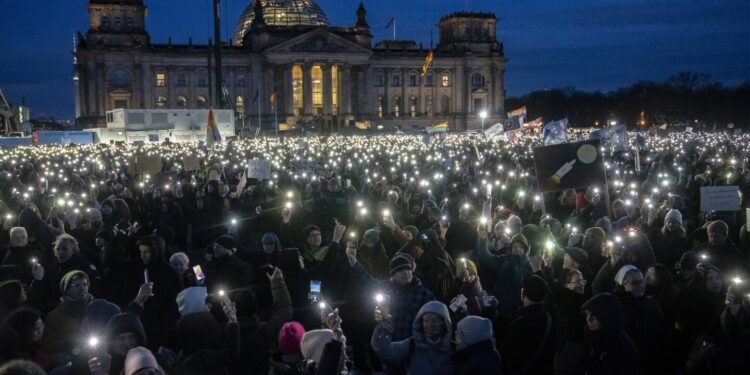BERLIN (news agencies) — When Sabine Thonke joined a recent demonstration in Berlin against Germany’s far-right party, it was the first time in years she felt hopeful that the growing power of the extremists in her country could be stopped.
Thonke, 59, had been following the rise of the Alternative for Germany, or AfD, with unease. But when she heard about a plan to deport millions of people, she felt called to action.
“I never thought such inhuman ideas would be gaining popularity in Germany again. I thought we had learned the lessons from our past,” Thonke said.
Many Germans believed their country had developed an immunity to nationalism and assertions of racial superiority after confronting the horrors of its Nazi past through education and laws to outlaw persecution.
They were wrong.
If an election were held today, the AfD would be the second largest party, according to polls.
But national polls camouflage an important division: the AfD has disproportionate support in the formerly communist and less prosperous eastern states of Germany.
After the fall of communism in 1989 and the unification of East and West Germany a year later, many people in the five eastern states lost not only their jobs but their collective past, leaving them disoriented and helpless in the capitalist system.
The AfD’s rise has been propelled by anger over inflation and, above all, rising immigration. The EU received 1.1 million asylum requests in 2023, the highest number since 2015. Germany got by far the largest number of claims — more than 300,000 — mostly from Syria, Afghanistan and Turkey. The country has also taken in more than a million Ukrainian refugees displaced by Russia’s invasion.
Voters in Germany and across Europe are increasingly empowering far-right nationalist parties who promise to restrict immigration and, in some cases, constrain democratic freedoms of religion, of expression, of the right to protest. These forces have bubbled up in France, Italy, the Netherlands and Austria.
After 1945, West Germans grew up with the guiding principle that there should “never again” be a dictatorship on German soil. West German leaders made visits to Israel and apologized to the countries occupied by the Nazis, while schoolchildren were taken to see concentration camps or Holocaust memorials.
But in the East, a self-declared anti-fascist society, young people were taught that they were only the descendants of the Nazis’ victims.
Thonke, who works at Berlin’s water utility, grew up in Bavaria, which was part of West Germany before reunification in 1990. She said she did not speak much with her grandparents — the Nazi generation — about what happened during the Third Reich, but learned about Adolf Hitler’s rise to power and the Holocaust in school.
Today’s far right is using similar tactics, she said, exploiting people’s fears to win their trust and their votes.
“I understand that many people are worn out from all these crises — the coronavirus pandemic, the war in Ukraine, the many migrants, inflation — and that they are afraid that things are going to get worse,” Thonke said. “But the solutions the AfD offers won’t solve any of these problems.”
Polls show the AfD as the top party in the eastern states of Saxony and Thuringia, with roughly 35% support in each. Both states have elections this fall, along with the eastern state of Brandenburg, where the AfD is also expected to make strong gains.
The AfD’s appeal is particularly strong among men and, increasingly, younger voters.
In the last state elections in Hesse and Bavaria in October, AfD made significant gains among voters 24 and younger, which experts attributed to young voters’ frustration with migration and the party’s savvy internet presence. About two-thirds of the party’s voters are men.
The party has benefitted from voters’ deep frustration with Chancellor Olaf Scholz. His government came to power over two years ago with a progressive, modernizing agenda, but now is viewed by many as dysfunctional and incapable.
The AfD’s Thuringia branch is particularly radical and was put under official surveillance by the domestic intelligence service four years ago as a “proven right-wing extremist” group.



 Pakistan Rupee Exchange Rate
Pakistan Rupee Exchange Rate





